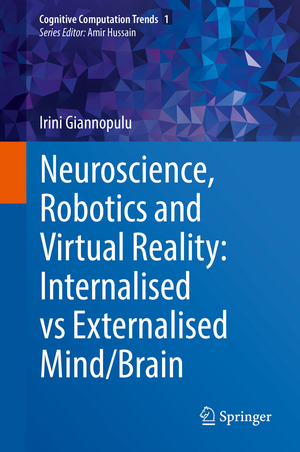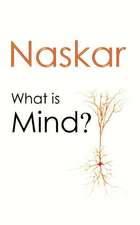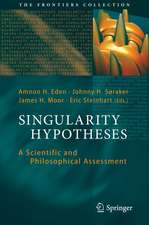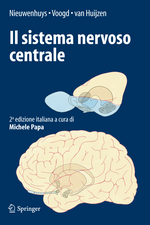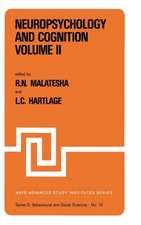Neuroscience, Robotics and Virtual Reality: Internalised vs Externalised Mind/Brain: Cognitive Computation Trends, cartea 1
Autor Irini Giannopuluen Limba Engleză Hardback – 5 mar 2019
Integrating research in the field of the Neuroscience, Robotics and Virtual Reality, this book is an original and attainable resource that has not been developed in any other writing. In 5 chapters, the author considers that representations are based on allegorical traces and are consciously and/or unconsciously embrained, and that the creation of robots is the expression of the mind. Whole-body virtual motion is thought of as the archetypal expression of virtual reality. Therefore, visual reality is analysed in a context of visuo-vestibular and somesthetic conflict while mixed and augmented reality are scrutinised in a context of visuo-vestibular and somesthetic interaction.
This monograph is an indispensablehandbook for students and investigators engaged in history of science, philosophy, psychology, neuroscience, engineering and those interested in there interconnections. The ambition of the book is to give students and investigators ideas on which they can build their future research in this new blooming area.
Preț: 1110.72 lei
Preț vechi: 1354.54 lei
-18% Nou
Puncte Express: 1666
Preț estimativ în valută:
212.60€ • 231.01$ • 178.70£
212.60€ • 231.01$ • 178.70£
Carte tipărită la comandă
Livrare economică 22 aprilie-06 mai
Preluare comenzi: 021 569.72.76
Specificații
ISBN-13: 9783319955575
ISBN-10: 3319955578
Pagini: 180
Ilustrații: XI, 216 p. 52 illus., 44 illus. in color.
Dimensiuni: 155 x 235 x 15 mm
Greutate: 0.5 kg
Ediția:1st ed. 2018
Editura: Springer International Publishing
Colecția Springer
Seria Cognitive Computation Trends
Locul publicării:Cham, Switzerland
ISBN-10: 3319955578
Pagini: 180
Ilustrații: XI, 216 p. 52 illus., 44 illus. in color.
Dimensiuni: 155 x 235 x 15 mm
Greutate: 0.5 kg
Ediția:1st ed. 2018
Editura: Springer International Publishing
Colecția Springer
Seria Cognitive Computation Trends
Locul publicării:Cham, Switzerland
Cuprins
Preface.- Introduction.- The mind.- Dynamic Embrained Systems.- Externalised Mind 1.- Externalised Mind 2.- Index.
Textul de pe ultima copertă
This is the first volume in the Cognitive Computation Trends book series, summarising our understanding on the neural correlate of memory, perception-representation, action, language, emotion and consciousness and their mutual interactions.
Integrating research in the field of the Neuroscience, Robotics and Virtual Reality, this book is an original and attainable resource that has not been developed in any other writing. In 5 chapters, the author considers that representations are based on allegorical traces and are consciously and/or unconsciously embrained, and that the creation of robots is the expression of the mind. Whole-body virtual motion is thought of as the archetypal expression of virtual reality. Therefore, visual reality is analysed in a context of visuo-vestibular and somesthetic conflict while mixed and augmented reality are scrutinised in a context of visuo-vestibular and somesthetic interaction.
This monograph is an indispensable handbook for students and investigators engaged in history of science, philosophy, psychology, neuroscience, engineering and those interested in there interconnections. The ambition of the book is to give students and investigators ideas on which they can build their future research in this new blooming area.
Integrating research in the field of the Neuroscience, Robotics and Virtual Reality, this book is an original and attainable resource that has not been developed in any other writing. In 5 chapters, the author considers that representations are based on allegorical traces and are consciously and/or unconsciously embrained, and that the creation of robots is the expression of the mind. Whole-body virtual motion is thought of as the archetypal expression of virtual reality. Therefore, visual reality is analysed in a context of visuo-vestibular and somesthetic conflict while mixed and augmented reality are scrutinised in a context of visuo-vestibular and somesthetic interaction.
This monograph is an indispensable handbook for students and investigators engaged in history of science, philosophy, psychology, neuroscience, engineering and those interested in there interconnections. The ambition of the book is to give students and investigators ideas on which they can build their future research in this new blooming area.
Caracteristici
Transcends the historical perspective of neuroscience, robotic and virtual reality Attempts to integrate three domains, neuroscience, robotics and virtual reality in the same scientific framework Discusses the concept of enrobotment, perspective robotics and presence to inform our understanding of neurocognition as such
